WASHINGTON/ABBOTTABAD, Pakistan (Reuters) – Pakistan faced embarrassing questions from the United States yesterday over how al Qaeda leader Osama bin Laden was able to hide there in plain view before he was killed by a secret US assault team.
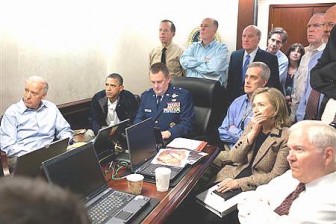
The revelation that bin Laden had been holed up in a compound near Islamabad threatened to exacerbate US tensions with nuclear-armed Pakistan, which had not been told of the raid in advance.
The shrouded body of the world’s most powerful symbol of Islamist militancy was buried at sea after he was shot in the head and chest by US special forces who were dropped inside his luxury compound by helicopters without the knowledge of Pakistani authorities.
Irate US lawmakers wondered how it was possible for bin Laden to live in a populated area without anyone of authority knowing about it or sanctioning his presence, possibly for years.
“The United States provides billions of dollars in aid to Pakistan. Before we send another dime, we need to know whether Pakistan truly stands with us in the fight against terrorism,” said Senator Frank Lautenberg, a Democrat on the Senate Appropriations Committee that apportions government spending.
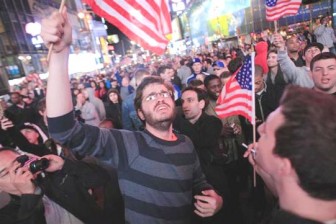
The White House acknowledged there was good reason for US lawmakers, already doubtful of Pakistan’s cooperation against al Qaeda, to demand to know whether bin Laden had been “hiding in plain sight” and to raise questions about continued US aid to Islamabad.
Bin Laden’s hideaway, built in 2005, was about eight times larger than other homes nearby. With its 12- to 18-foot walls topped with barbed wire, internal walls for extra privacy, and access controlled through two security gates, it looked like a strongman‘s compound.
White House counterterrorism chief John Brennan said it was “inconceivable that bin Laden did not have a support system in the country that allowed him to remain there for an extended period of time.”
President Barack Obama declared the world was a safer and “better place” with bin Laden dead. But the euphoria that drew flag-waving crowds to “Ground Zero” of the September 11, 2001, attack in New York was tempered by calls for vigilance against retaliation by his followers.
Obama planned to travel to New York on Thursday to visit Ground Zero and meet families of September 11 victims.
Bin Laden was given a sea burial after Muslim funeral rites on a US aircraft carrier, the Carl Vinson. His shrouded body was placed in a weighted bag and eased into the north Arabian Sea, the US military said.
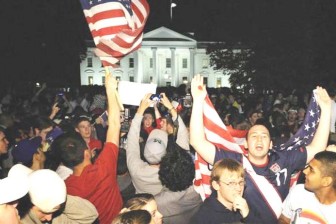
The Obama administration was weighing whether to release a photo of bin Laden’s body as proof that he had been killed.
Americans clamoured for details about the secret US military mission.
A small US strike team, dropped by helicopter to bin Laden’s hide-out near the Pakistani capital Islamabad under the cover of night, shot the al Qaeda leader to death with a bullet to the head. He did not return fire.
Bin Laden’s wife, originally thought killed, was only wounded. Another woman was killed in the raid, along with one of bin Laden’s sons, in the tense 40 minutes of fighting. She had not been used as a human shield as first thought.
Television pictures from inside the house showed bloodstains smeared across a floor next to a large bed.
Obama and his staff followed the raid minute-by-minute via a live video feed in the White House situation room, and there was relief when the commandos, including members of the Navy’s elite Seals unit, stormed the compound.
“We got him,” the president said, according to Brennan, after the mission was accomplished.
National Journal said US authorities used intelligence about the compound to build a replica of it and use it for trial runs in early April. Mindful of possible suspicion in the Muslim world, a US official said DNA testing showed a “virtually 100 percent” match with the al Qaeda leader.
“Yesterday is a defining moment in the war against al Qaeda, the war on terrorism, by decapitating the head of the snake known as al Qaeda,” Brennan said.
Under bin Laden’s leadership, al Qaeda militants struck targets from Indonesia to the European capitals of Madrid and London.
But it was the September 11 attacks, in which al Qaeda militants used hijacked planes to strike at economic and military symbols of American might and killed nearly 3,000 people, that helped bin Laden achieve global infamy.
Obama, whose popularity has suffered from continuing US economic woes, will likely see a short-term bounce in his approval ratings. At the same time, he is likely to face mounting pressure from Americans to speed up the planned withdrawal this July of US forces from Afghanistan.
However, bin Laden’s death is unlikely to have any impact on the nearly decade-long war in Afghanistan, where US forces are facing record violence by a resurgent Taliban.
Many analysts see bin Laden’s death as largely symbolic since he was no longer believed to have been issuing operational orders to the many autonomous al Qaeda affiliates.
“There are a lot of al Qaeda look-alike cells,” said Steve Clemons, a Middle East analyst at the New America Foundation. “Bin Laden was an animating force but there are other ways these groups get oxygen and can remain a threat.”
US stocks and oil prices closed modestly lower yesterday as investors concluded Osama bin Laden’s death will do little to ease global economic and political risks.
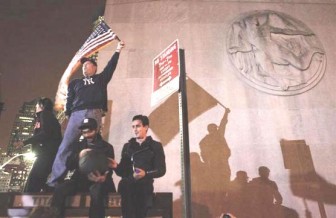
The US dollar erased early gains and the euro hit a 17-month high against the greenback on bets euro-zone interest rates will keep rising to fend off inflation.
Analysts warned that objections from some Muslim clerics to the sea burial could stoke anti-American sentiment. The clerics questioned whether the United States followed proper Islamic tradition, saying Muslims should not be buried at sea unless they died during a voyage.
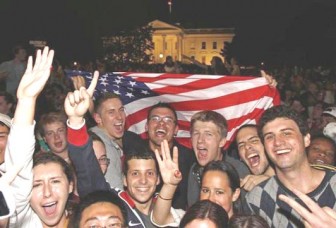
The United States issued security warnings to Americans worldwide. CIA Director Leon Panetta said al Qaeda would “almost certainly” try to avenge bin Laden’s death.
France’s President Nicolas Sarkozy hailed the killing as a coup in the fight against terrorism, but he, too, warned it did not spell al Qaeda’s demise. British Prime Minister David Cameron said the West should be “particularly vigilant.”
…mix of joy, relief and anger
NEW YORK (Reuters) – Survivors of Osama bin Laden’s al Qaeda attacks and relatives of victims welcomed his killing as the death of the devil yesterday but they also expressed anger and renewed grief for loved ones.
From Ground Zero where the Twin Towers were destroyed by hijacked planes in the September 11, 2001, attacks to a park outside the White House, people cheered the killing of the man most hated and reviled by Americans — Osama bin Laden.
“Osama bin Laden had the devil’s blood running through his veins and this is a joyous day for us,” said Rosemary Cain, who lost her 35-year-old son at the World Trade Center.
Maureen Santora’s 23-year-old son was killed in the 9/11 attacks but she said he was now “screaming and yelling and having a great time up in heaven today.”
Some victims’ family members also were upset bin Laden was living in apparent luxury and not cowed in a cave. They were angry, too, that his remains were disposed of respectfully, reminding them of unresolved fights over New York’s memorial.
The news of bin Laden’s death, announced by President Barack Obama late on Sunday, was greeted on American streets with jubilation, relief, closure and prayers for his victims.
“I never figured I’d be excited about someone’s death,” said firefighter Michael Carroll, 27, at Ground Zero, whose father, also a fireman, died in the September 11 attacks. “It’s finally here. It feels good.”
There also was visceral hatred expressed bluntly.
“I would like to have pissed on his body … He murdered my brother,” said John Cartier, 42, an electrician who survived the attacks and was holding a picture of his brother James Cartier, who was 26 when he died at the World Trade Center.
At the site, which is still years from being rebuilt and where an emotional 10th anniversary is planned, hundreds sang “The Star Spangled Banner.” Some popped champagne, others drank beer, some threw rolls of toilet paper.
“It was like a frat party. It was an excuse for people to … proclaim ourselves as No 1,” said Sebastian Slayter, 22, who saw the 9/11 attacks from a few blocks away. “It didn’t seem like anyone was searching for any knowledge … we should be celebrating for the right reasons: The monster is dead.”
But celebrations were tempered as old wounds reopened.
The Uniformed Firefighters Association of Greater New York noted a decade after the attacks, which killed 343 New York firefighters, more than 100 firefighters have since died from toxic exposures, and many others are chronically ill.
The Council on American-Islamic Relations urged Americans to reject intolerance after a Portland, Maine, mosque was daubed with anti-Islam graffiti; “Osama today, Islam tomorow (sic).”
Stuart Kestenbaum of Maine, whose brother Howard died in the World Trade Center said, “There is a sense of closure but also of awe at all the loss that followed the original loss … so I didn’t feel celebratory, more reflective.”
Nearly 3,000 people died when planes hijacked by bin Laden’s followers flew into the World Trade Center, the Pentagon and into a field in Pennsylvania. The attacks shocked the world and sparked a hunt for the plot’s architect.
Bin Laden had been in hiding since he eluded US forces and Afghan militia in the Tora Bora mountains of Afghanistan in 2001. He had taunted the West and directed militant Islamist activities with taped messages from his hideout.
The announcement of bin Laden’s death and his speedy burial at sea had the potential to set off conspiracy theorists.
“It has unfortunately opened this up to the possibility of conspiracy theories,” said Sally Regenhard, who lost her 28-year-old brother on 9/11.





